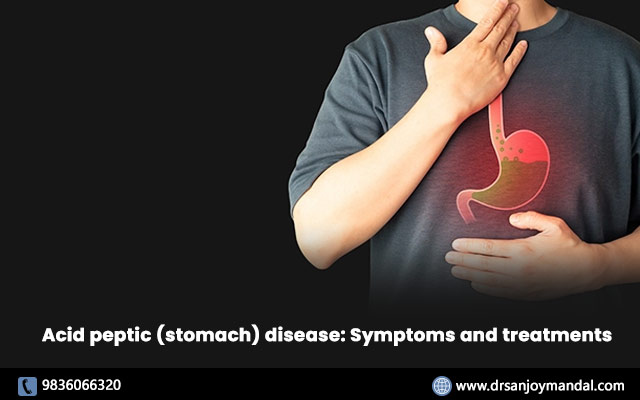Acid peptic disease encompasses numerous conditions like gastritis, acid reflux, peptic ulcers, and more. This disorder involves the imbalance of the stomach’s digestive acids and the erosion of the protective lining of the gastrointestinal tract. It’s important to understand the different symptoms and treatments of this condition to manage it effectively. Get to know more from the top gastro surgeon in Kolkata.
Symptoms
- Heartburn: It is characterized by a burning sensation in the chest, often after eating and is a sign of acid reflux. This happens when the stomach acid flows back into the oesophagus, causing discomfort and irritation.
- Regurgitation: Sour-tasting fluid backing up into the throat or mouth is another prevalent symptom of acid peptic disease. It is sometimes combined with heartburn and can cause an unpleasant taste in the mouth.
- Nausea and Vomiting: This condition can cause nausea along with vomiting in some cases. These symptoms might be intermittent or persistent, depending on the severity of the condition.
- Dyspepsia: Pain or discomfort in the upper abdomen that commonly occurs after meals characterize dyspepsia. It might be present as a feeling of bloating, fullness, or general discomfort.
- Peptic Ulcers: Acid peptic disease can result in peptic ulcers. These are lesions or sores that form on the lining of the duodenum, causing bleeding, pain, and sometimes obstruction or perforation.
Treatments
- Medications: Over-the-counter acids, PPIs or proton pump inhibitors like pantoprazole or omeprazole, and H2 blockers like famotidine or ranitidine can offer relief by reducing the production of stomach acid. These medications are prescribed based on the kind and severity of the condition.
- Dietary changes: Adapting to a diet that minimizes the triggers of acid reflux is essential. Consumption of alkaline foods like vegetables, non-citrus fruits, and lean proteins, and reducing the intake of alcohol, caffeine, acidic and fatty foods can help in managing the symptoms associated with acid peptic disease.
- Medical Procedures: In cases when medications prove to be inefficient, the best gastrointestinal surgeon might recommend endoscopic procedures that can help in healing ulcers or repair the lower oesophageal sphincter to prevent reflux.
- Lifestyle modifications: Certain lifestyle changes can significantly reduce the symptoms of acid reflux. Avoiding trigger foods (fatty, acidic, and spicy), maintaining a healthy weight, having light meals, and avoiding lying down immediately after meals can help manage acid reflux and other related symptoms.
If you experience the aforementioned symptoms, reach out to the top gastro surgeon in Kolkata to receive a proper diagnosis and thorough treatment plan to manage the condition.
